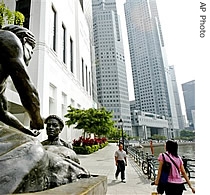2007年VOA标准英语-Asia Threatened by Global Financial Imbalances,(在线收听)
Kyoto
04 May 2007
Asia's economic development is a success story that has been decades in the making. But in the past decade, the region has become a key factor in a global imbalance marked by too much reliance on exports by countries in one part of the world and excessive consumption by countries in another part, such as the United States. As senior officials from the Asian Development Bank gather in Kyoto, Japan, some say the way to end this imbalance is through regional economic integration. VOA's Kurt Achin is in Kyoto with more.
 |
| People walk pass a statue of traders from the olden days in Singapore, while the financial district is seen in the background (File) |
Friday, as delegates from the 67 member nations of the Asian Development bank gathered here in Kyoto, Japan, it was clear that picture has changed. Asian nations such as South Korea, Japan and China have trade surpluses, and the region holds a combined total of $3 trillion in foreign currency reserves.
More than a trillion dollars of that is held by China alone - a fact that worries Yu Yongding, president of the Chinese Academy of Social Sciences in Beijing.
"By far, it's too much," he said. "Actually, we are worried about how to deal with these huge foreign reserves."
These massive surpluses are the flip side of a massive trade deficit in the United States. Experts say the two regions are locked into an unattractive cycle of export-led development in Asia, fueled by U.S. imports, which in turn is underwritten by Asian lending.
Nouriel Roubini, finance professor at New York University, says Asia can no longer afford to rely so exclusively on the United States.
"There are now meaningful risks of a U.S. hard landing, and that can become problematic," he said. "If the U.S. hard landing were to occur, the effects on the [Asian] region will be severe."
Delegates are using the meeting here to discuss what they believe is a solution to the problem: weaning the region away from reliance on the U.S. through closer regional integration, similar to that in the European Union.
But that takes political will, and a willingness to give up some national sovereignty. Toyoo Gyohten, president of the Japan-based International Institute of Monetary Affairs, says the region is not ready.
"I'm afraid East Asia does not yet have a clear, strong, and unanimous view of the need and the cost of regional integration," he said.
Experts say that is partially because of the extreme diversity in this region. Countries like South Korea and Laos, for example, are at vastly different economic levels.
Mulyani Indrawati, Indonesia's minister of finance, says Asian leaders are not truly convinced that their actions toward integration will be matched by other countries.
"To become the first mover, you become a hero, but a victim at the same time, so… if there is no guarantee of regional coordinated and concerted effort, or even global coordinated and concerted effort, then each country moves toward safeguarding yourself," she said.
She says the best hope for the short term is for national governments to put their own economies in order, with good transparent business practices. If they do that, she says, integration will come more naturally.